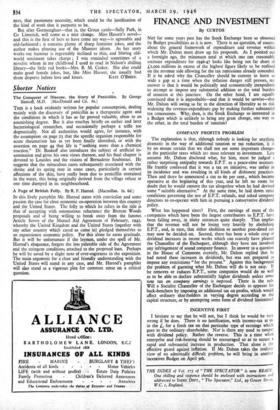FINANCE AND INVESTMENT
By CUSTOS
NOT for some years past has the Stock Exchange been so obsessed by Budget possibilities as it is now. There is no questibn, of course; about the general framework of expenditure and revenue within which Mr. Dalton must draw up his proposals. As I pointed out a fortnight ago, the minimum total at which one can reasonably estimate expenditure for 1946-47 looks like being not far short of £i,000 millions in excess of the highest figure likely to be realised on the revenue side allowing for the tax remissions already conceded. If it be asked why the Chancellor should be content to leave so wide a gap at a time when the inflation danger still presses, my answer is that it would be politically and economically inexpedient to attempt to impose any substantial addition to the total burden of taxation at this juncture. On the other hand, I am equally
convinced that it is in that it would be unwise‚ÄĒthat Mr. Dalton will swing so far in the direction of liberality as to risk widening the revenue-expenditure gap by making further substantial tax concessions. Why, then, is the Stock Exchange so interested in a Budget which is unlikely to bring any great change, one way 01 the other, in the total burden of taxation?
COMPANY PROFITS PROBLEM The explanation is that, although nobody is looking for anything dramatic in the way of additional taxation or tax reduction, it is by no means certain that we shall not see some important changes in the particular taxes which are most relevant to investment. Last autumn Mr. Dalton disclosed what, for him, must be judged a rather surprising antipathy towards E.P.T. as a peace-time measure. He frankly confessed that it was a tax on initiative, was unfair in its incidence and was resulting in all kinds of dishonest practices. Then and there he announced a cut to 6o per cent., which became operative at the beginning of this year, and he left no room for doubt that he would remove the tax altogether when he had devised some " suitable alternative." At the same time, he laid down strict conditions governing the use of E.P.T. refunds, and asked company directors to co-operate with him in pursuing a conservative dividend policy.
What has happened since? First, the earnings of most of the . companies which have been the largest contributors to E.P.T. have been falling away, in many instances quite sharply. That implies that the revenue will not be losing very heavily by abolishing E.P.T., and, in turn, that either abolition or another post-dated cut may now be decided on. Second, there has been a whole crop of dividend increases in recent weeks which can scarcely have pleased the Chancellor of the Exchequer, although they have not involved any infringement of sound company finance. In answer to a question in the House of Commons recently, Mr. Dalton replied that he had noted these increases in dividends, but was not prepared :o impose any restrictions " for the present." . Against this background the problem of guessing what Mr. Dalton will do is not easy. If he removes or reduces E.P.T., some companies would do so well as to be able to declare substantially higher dividends unless some new tax on company earnings is imposed. There is the rub. Will a Socialist Chancellor of the Exchequer decide to appease his back-benchers by imposing an additional tax on profits, which would affect ordinary shareholders in varying degree according to the capital structure, or by attempting some form of dividend limitation?
INCENTIVE FIRST I hesitate to say that he will not, but I think he would be ver‚Ė† wrong if he does. There is no justification, with income-tax at 9s. in the ¬£, for a fresh tax on that particular type of earnings which goes to the ordinary shareholder. Nor is there any need to tamper with dividend policy. Rather the reverse. This is a time when enterprise and risk-bearing should be encouraged so as to secure a rapid and .substantial increase in production. That alone is the effective guard against inflation. If Mr. Dalton takes the realistic view of an admittedly difficult problem, he will bring in another incentives Budget on April 9th.


























 Previous page
Previous page